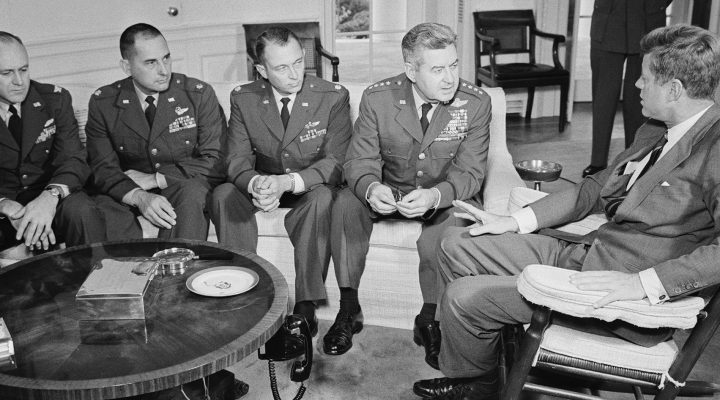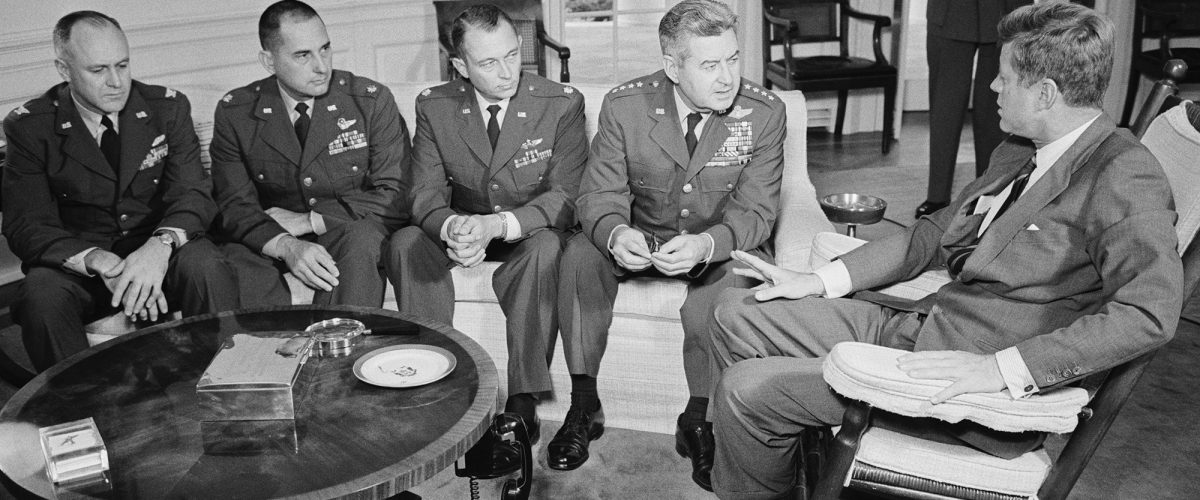Some readers will remember moments like those I experienced in Mr. Shea’s 10th grade world history class, as we listened via the intercom to the radio describing what we thought could be the last minutes of the world.
The Cuban Missile Crisis, 13 days in October 1962, are one of those “Where were you when…?” episodes etched into our minds and souls.
The U.S. and Russia came close to a nuclear nightmare. Moreover, anxiety surged Butler High School: Maybe we never would see our parents again … Maybe we wouldn’t be alive to take Mrs. Myer’s fifth period algebra exam…. Maybe the mighty Bears would not take the football field on Friday night. Many of us were “sure” that Louisville, because of proximity to Fort Knox, would be targeted with an early missile.
Of course, I — a fundamentalist — was listening to rebooted altar call music in my brain, “There’s a great day comin’, a great day comin’ (although the lyricist did not mean a nuclear disaster). And there were snippets from over-excited evangelists who had seen John Kennedy’s election as fulfilling biblical prophesies — the way they interpreted those prophesies. What about my relatives who were not “right with the Lord”? In a “blink of an eye” too late!
At Thanksgiving, many people are good for gratituding recent blessings — or what they consider blessings. “What has God done for you lately?” was the dominant highlight of our church’s Wednesday night prayer/testimony meetings.
“There are things we do not know we need to be grateful for.”
But there are things we do not know we need to be grateful for. There are events we haven’t wrapped in gratitudes because we did not know about them. Some blessings we never would have known about had we not discovered details in a family narrative.
The crisis we thought was averted
Recently I purchased a used copy of Richard Rhodes’ 1995 bestseller, Dark Sun: The Making of the Hydrogen Bomb, in which he reviewed, from our safe historical vantage point, details of events that had transpired during those epic 13 days in 1962. Learning the Russians were installing/had installed missiles with nuclear warheads 90 miles off the U.S. coast, the Kennedy administration demanded they be withdrawn.
In Mr. Shea’s class, we waited in rapt silence as the U.S. Navy prepared to stop Russian ships transporting more nuclear weapons to Havana.
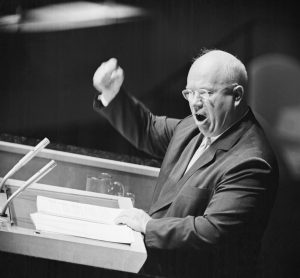
Soviet Premier Nikita Khrushchev pounds his fist against the podium while addressing the United Nations General Assembly in Manhattan, New York City, September 23, 1960. The Soviet Premier called for the resignation of UN Secretary General Dag Hammarskjold. (Getty Images)
The young president, John Fitzgerald Kennedy, was being tested by the gruff elderly godless villain, Nikita Khrushchev — and, to some in our church, possibly the antichrist. Who would blink first?
Kennedy also was being tested by the U.S. military establishment, notably the bombastic Gen. Curtis LeMay, chief of staff for the Air Force and commander of the Strategic Air Command. Already the cigar-chomping LeMay had “chewed out” the president for his caution. Indeed, he called Kennedy “a coward” only in stronger language than can appear within quotation marks in Baptist Global News.
Richard Rhodes insisted LeMay thought of the confrontation as a poker game. And, in his “esteemed” judgment, the U.S. “had the best cards.” (Apparently the general never had read Paul’s admonition that no man — even a man wearing a general’s stars — should “think of himself more highly than he ought to think.”)
LeMay wanted Kennedy to “put it to” Khrushchev and Fidel Castro. LeMay thought it was time not only to get the missiles — presumably pointed at the United States — out of Cuba but get the “communists out of Cuba” at the same time.” If only that fill-in-the-blank Kennedy had listened to me, LeMay fumed for years.
I am only writing this column because Kennedy, at his brother Robert and Secretary of Defense Robert McNamara’s nudging, resisted LeMay’s bullying. Simply, in the words of the cliché, “brighter minds prevailed” although LeMay stormed out of the White House livid.
That crisis was adverted when the Russian ships stopped dead in the Atlantic and, eventually, turned and sailed back to Russia. Whew! was the collective sigh of Americans, while “Praise the Lords!” resounded like summer thunder in Christian circles. In fact, in our prayer meeting, the saints were quick to give the Lord credit rather than Kennedy because “Christians had prayed” and “God had heard from heaven.”
No doubt about it. In fact, prayer meeting sparkled the following night because “we had been spared.” Naturally, some advanced a wonderful prooftext from Isaiah, “No weapon formed against thee shall prosper” quoted in the only version our church permitted, the blessed King James, Red Letter Edition. Others emphasized, “If my people, which are called by my name, shall humble themselves, and pray, and seek my face, and turn from their wicked ways; then will I hear from heaven, and will forgive their sin, and will heal their land” (2 Chronicles 7:14). God would not allow America to be obliterated by godless communists!
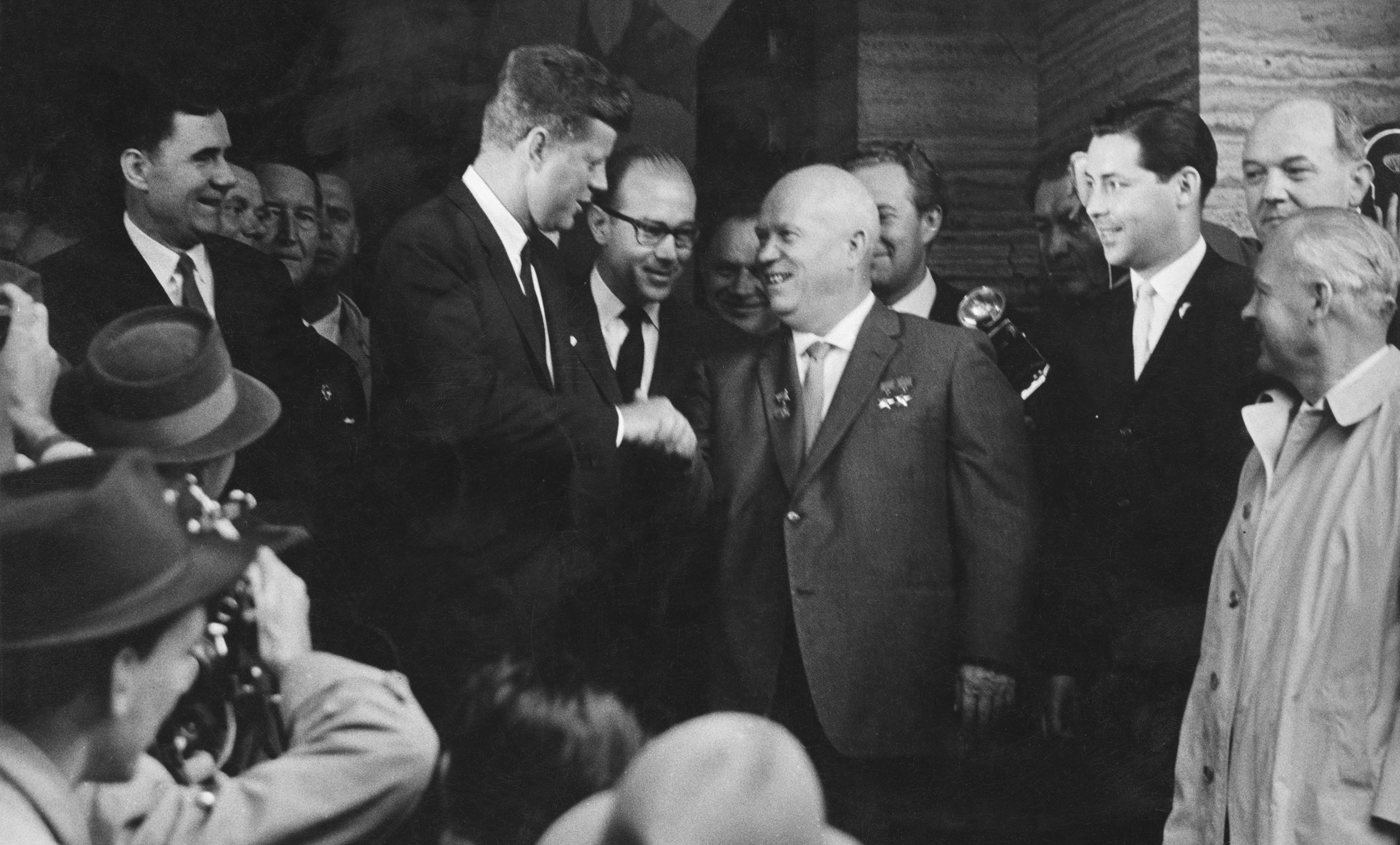
US President John F Kennedy (left) shakes hands with Soviet Premier Nikita Khrushchev at the Vienna Summit, Austria, June 4, 1961. (Photo by Pictorial Parade/Archive Photos/Getty Images)
‘We don’t know the half …’
My Dad’s de facto commentary on political issues was: “We don’t know the half…” or “They’re not telling us the whole story …” My father’s notion has come to my mind many times in recent days hearing chatter about the “What if X, Y or Z” leads to nuclear war in the Middle East. And thankfully, for a few weeks, Chairman Kim and North Korea’s nuclear mischief has been placed on the back burner.
But that was then. Butler High, after all, played a football game on Friday night and we did homework over the weekend. On Sunday we went to Sunday school, church and came back on Sunday night for more. And no few pastors borrowed from the angst to ask, “Would you have been ready?”
Decades passed and I received an undergraduate degree in American history. One morning I stuffed Rhodes’ weighty tome in my book bag for my morning excursion to McDonalds. As I read, suddenly a series of words on the page stopped me cold. Rhodes wrote:
What Curtis LeMay … did not know — what no one in the U.S. government knew until it was revealed at a conference between Soviet and U.S. missile participants in Moscow in 1989 — (that’s 26 years later) was that, contrary to CIA estimates, the Soviet forces in Cuba during the missile crisis possessed 20 nuclear warheads for medium-range R-12 ballistic missiles that could be targeted on U.S. cities as far north as Washington, D.C.
I continued reading.
As well as nine nuclear weapons which the Soviet field commanders in Cuba were delegated authority to use — the only time such authority had been delegated by the Soviet leadership.
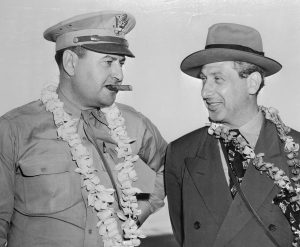
Meeting while en route to the Able Day Atom Bomb Test at Bikini Atoll are Major General Curtis E. LeMay, cigar chewing Chief of the B-29 attacks on Japan (L), and Aeronautical Engineer and author Major General Alexander P. De Seversky. (Getty Images)
LeMay, among other military leaders, in the late 1940s and during the Korean War (1950-1953) were anxious to go ahead and destroy Russia and China “once and for all.” LeMay boasted — and the man had a great talent for “boasting”— he could launch 750 atomic bombs on Russia “overnight.” LeMay mused, “Might as well get this over now” rather than kick the can down the road.
Later, Gen. Curtis LeMay — as George Wallace’s running mate on the American Independent Party ticket in 1968 — insisted the United States had “lost” both the Cuban Missile Crisis and the Cold War. On the campaign trail he vigorously urged the use of atomic weapons on the North Vietnamese. Why have bombs, he reasoned, if you aren’t going to use them?
If Russian field commanders had pressed “the button” …
If John Kennedy had caved into the demands of “warriors” in the Defense Department …
Millions of Americans would have been killed. And millions of Russians.
I want to believe God heard the prayers of millions — even prayers of those who had not voted for Kennedy — that God would give the president wisdom. And, I believe, God did.
Giving thanks
So, this Thanksgiving I am giving thanks that some Russian field commander named Igor, Mikhail, Vladimir, Oleg or Ivan did not act but stood down. I find words in Psalm 107 comforting and timely:
Let them give thanks to the Lord for his unfailing love
and his wonderful deeds for mankind.
Let them sacrifice thank offerings
and tell of his works with songs of joy.
I may be too generous in interpreting Ephesians 5: “Speaking to one another with psalms, hymns and songs from the Spirit” and sprinkled with a few historical footnotes: “Always giving thanks to God the Father for everything, in the name of our Lord Jesus Christ.”
Or, perhaps Psalm 95:1, “Let us shout out praises to our Protector who delivers (delivered) us.” And who had delivered us when we didn’t even know all the details of that deliverance.
Of course, had I read Dark Sun when it was first published in 1995, I would have formed my gratitudes then rather than three decades later.
This Thanksgiving might be a good time to ponder the lyrics of Don Moen’s song, “God Will Make a Way”: “He works in ways we cannot see” or even imagine. And for that we can be most grateful.
Postscript
The morning day after submitting this essay to Baptist News Global, I was reading a new book by General David Petraeus and Andrew Roberts. I am trying to understand the unending nightmare unfolding in Ukraine and the political maneuvering of some Americans who have concluded it is time for the U.S. to disengage from Ukraine.
Certainly, I knew Putin and his henchman Sergei Lavrov had been “warning” Ukraine — and the West — about the potential deployment of tactical nuclear weapons; in fact, Putin has claimed NATO already threatened Russia with nuclear weapons. I had dismissed Putin’s threats as a consequence of excessive consumption of vodka.
Gen. Petraeus sobered me with these words: Putin’s “blatant nuclear saber-rattling” was the “first instance since the Cuban Missile Crisis in 1962 that Western leaders had seriously to consider the heightened likelihood of nuclear weapons being used by a great power.” (Emphasis mine.)
Petraeus informed readers, “Russian war games routinely envisage the use of tactical nuclear weapons.” And, of course, the West now has threatened “catastrophic consequences for the (Russian) use of any nuclear weapons.”
After I closed the book and began my morning walk, I found myself back in Mr. Shea’s world history class. Waiting.
So, another blessing for which I will be grateful Thursday is that God is working behind the scenes — indeed, “in ways I can see” — apparently through India and China, to calm a threatened Russian thug.
God, make me grateful for all the blessings I am unaware of at the moment.
“The steadfast love of the LORD never ceases; his mercies never come to an end; they are new every morning; great is your faithfulness.”

Harold Ivan Smith
Harold Ivan Smith is thanatologist and independent scholar. For 18 years he served on the teaching faculty of Saint Luke’s Hospital in Kansas City, Mo. He earned graduate degrees from Scarritt College, Vanderbilt University, and a doctor of ministry degree from Asbury Theological Seminary. His writings include A Decembered Grief, On Grieving the Death of a Father; Grieving the Death of a Mother; When You Don’t Know What to Say; When a Child You Know Is Grieving, When Your People Are Grieving: Leading in Times of Loss.

